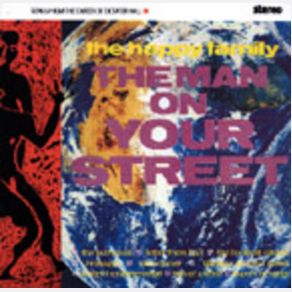The Man On Your Street
Download links and information about The Man On Your Street by Happy Family. This album was released in 1982 and it belongs to Rock, Pop, Alternative genres. It contains 12 tracks with total duration of 50:03 minutes.

|
|
|---|---|
| Artist: | Happy Family |
| Release date: | 1982 |
| Genre: | Rock, Pop, Alternative |
| Tracks: | 12 |
| Duration: | 50:03 |
| Buy it NOW at: | |
| Buy on iTunes $9.99 | |
| Buy on Amazon $9.49 | |
Tracks
[Edit]| No. | Title | Length |
|---|---|---|
| 1. | The Salesman | 3:19 |
| 2. | Letter from Hall | 3:39 |
| 3. | The Luckiest Citizen | 4:34 |
| 4. | Revenge! | 4:27 |
| 5. | The Courier | 3:31 |
| 6. | The Man On Your Street | 4:46 |
| 7. | A Night Underground | 4:57 |
| 8. | Two of a Kind | 4:15 |
| 9. | March In Turin | 5:16 |
| 10. | Puritans | 3:15 |
| 11. | Innermost Thoughts | 3:18 |
| 12. | The Mistake | 4:46 |
Details
[Edit]Hearing Nick Currie singing in a decidedly youthful and almost too precious for words fashion that makes his later work as Momus seem like Bon Scott is one thing, but is the album itself any good? Happily the one full-length work that the Happy Family gave the world, expanded on CD thanks to the inclusion of the Puritans single, is a wry little treat. Its connections to Momus' solo work is almost exclusively through the vocals, and even those, as noted, don't quite sound the same — otherwise, the results from the band are rushed pre-Smiths post-punk indie pop, the type of thing that Girls at Our Best! fans are likely to love. There's plenty of hints of the Postcard-era material that inspired Currie as well (then again, what else could be expected with Weddell in the band) not to mention a bit of goth work here and there (check out the instrumental breaks on "Letter From Hall" or the tense start of the title track). The guest sax from Steve Kettley and violin from Kirsteen McCormick add a nicely off-sense of semi-sophistication to the whole affair, and as a whole The Man on Your Street sounds pitched somewhere between the try-anything-once early-'80s U.K. pop scene and its understated indie milieu. Currie claimed to feel himself as the cross between Mark E. Smith and Kasper Hauser, but generally he comes across as the Bowie-worshipper he undoubtedly was, crossed with a jaunty smoothness that suggests what the musichall tradition would have sounded it if it were more French than Cockney. No matter, it's all good fun spiked with the sly bitterness later Momus records would bring to the fore, and some of the lyrics are still a hilarious scream: "I'm tying up my future with a fine organization/It's called the Red Brigades and they treat employees well."